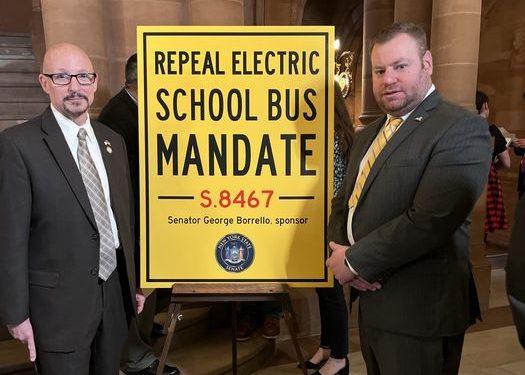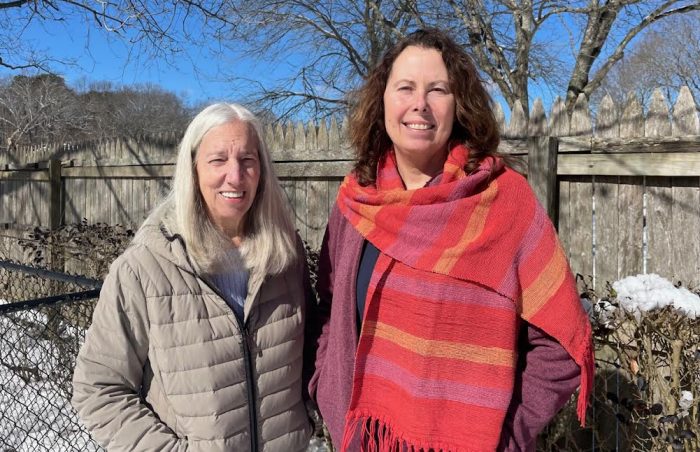By Julianne Mosher
For what is now a quarter of a century, Theatre Three’s Annual Festival of One-Act Plays is a favorite tradition that should not be missed out on.
Now in its 25th year, more than 12,000 submissions from playwrights across the country have been sent to the Port Jefferson-based theater over the years in hopes that their short, under 30-minute shows have a shot of being performed on stage. This season, Director Jeffrey Sanzel said there were over 2,000 submissions and just eight made the cut. Of those eight, none disappointed.
For an-hour-and-a-half, during Sunday, Feb. 25th’s performance, the nearly sold-out audience sat quietly, engaged, watching, listening to what is about to appear on stage. The festival brings these little vignettes that are full of story — some that are hysterically funny, while others leave the room quiet because of how serious and emotional the act ends.
The festival opens with Brian C. Petti’s Bovine Existential, with Linda May and Phyllis March playing two cows who are waiting in a slaughterhouse holding pen discussing fate, mortality and morality. Both May and March play the animals well, and while a serious topic of philosophy, they still had the audience in stitches.
The second act features Deirdre Girard’s A Year to Grieve and at first the audience doesn’t expect what will eventually happen. We see Thomas (Evan Teich) and Heather (Brittany Lacey), two mystery crime writers working on Heather’s latest novel. The friendship between the two is sweet, until one decides to make fiction real. Both Teich and Lacey shine — as usual, since both are returning Festival performers.
To lighten the mood, we’re sent to a tomb in Verona, Italy to see Juliet (Cassidy Rose O’Brien) who woke up from her slumber and didn’t kill herself with her fiancé’s dagger in Juliet Wakes Up by Laura Neill. Compared to the original Shakespearean tragedy, this is anything but. Quite frankly, this should be a whole show on Broadway, rather than the & Juliet musical that is currently out. I like this version better. Juliet is met by Rosaline (Julia Albino), her cousin, and Willow (Gina Lardi), the apothecary worker who sold the poison to begin with. The three ladies hatch a plan to hide Romeo’s (Jae Hughes) body after Juliet stabbed him to death, instead.
The first half ends with Rescue by Kevin Podgorski, and this one is not for the weak at heart. We’re introduced to Dot (Ginger Dalton), who has a large bruise on her face. She’s talking on the phone with her two friends, Maeve (March) and Allen (Andrew Markowitz), who are desperately trying to help her out of a toxic and dangerous home situation at the hands of her grandson, Charlie (Steven Uihlein) that Dot has been taking care of since his mother died. Powerful and sad, when the act ended there was a silence, with several audience members saying, “wow.”
After a brief intermission, we’re set in a car on a highway leading to the Colorado border for Aleks Merilo’s The Nearest Far Away Place. A young woman (Courtney Gilmore) hitch hiked a ride from Wisconsin by a man who eventually we learn is a corrections officer played by Rob Schindlar. Uncomfortable and nervous about what is waiting for her across state lines, the young girl tries to chat the man up, but quietly spoken, he has no interest until he begins talking about his own family and how he hasn’t spoken to his own daughter in years. With a serious undertone, it has its highlights that will make you laugh because of the two opposite personalities; Gilmore’s annoying teenage girl self (which we can all relate to somehow) and Schindlar’s stoic manly façade.
A complete left turn into Lisa Dellagiarino Feriend’s The Curse, we’re taken into an alternate version of The Little Mermaid featuring a mer-man, Jeremy (Sean Amato) who was washed up on land and realizes he has feet. Turns out, an evil enchantress named Donna (his co-worker of all things) turned him human as punishment for his man-splaning over her during staff meetings. He only comes to this realization by Beth (O’Brien), a passerby who sides with Donna. After some serious plays beforehand, this one was funny and lighthearted, which is just what we needed.
In Grave Matters by Michele Markarian, Paula (Lardi) is at the grave of her father asking for a sign from him to get over the family drama since her parents had passed. Well, the dad didn’t show, but her mom, Beth (Dalton) came by instead. This one, again, has those serious undertones, but Dalton’s annoying motherly comments (that again, we can all relate to somehow) make it funny and surprisingly realistic — despite her being a ghost, of course.
And we end with the beautifully crafted The Hike to Hart Lake by Johanna Beale Keller which features Albino, Amato, Hughes, O’Brien and Uihlein as five friends who hike up a mountain in their 20s to a beautiful scenic view they never forget. Always saying they should all go back, life happens, there are deaths and slowly the group becomes one over the course of 80 years. While all five actors are standouts, Hughes had the audience in tears with their powerful monologue at the end of the performance.
With a minimal set with just a few props moved around for each play, the costumes designed by Jason Allyn match each performance perfectly — and remember, we’re sent from present day, to the 14th Century and then into the future. So, buckle up, grab some tissues and make sure you sit in for The 25th Annual Festival of One-Act Plays. It isn’t just a show… it’s an experience you won’t want to miss.
Theatre Three, 412 Main St., Port Jefferson presents the 25th annual Festival of One-Act Plays through March 23 at The Ronald F. Peierls Theatre, on the Second Stage. All seats are $25. Please note: Adult content and language. Parental discretion is advised. To order, call 631-928-9100 or visit www.theatrethree.com.


























































 One of your important sources of retirement income will likely be Social Security — but when should you start taking it?
One of your important sources of retirement income will likely be Social Security — but when should you start taking it?


